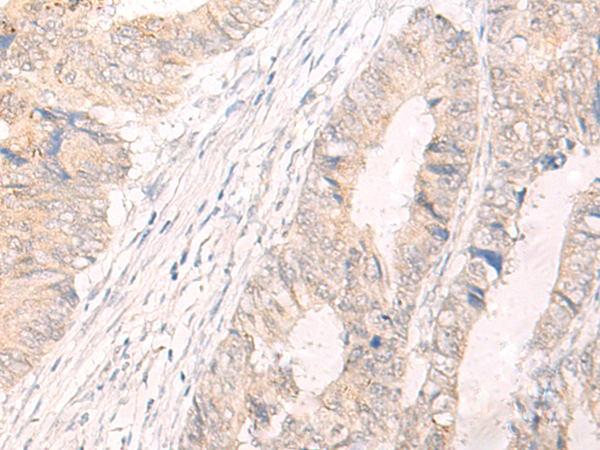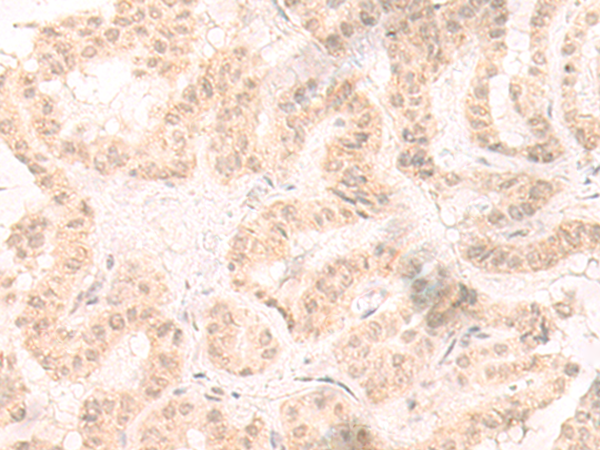

| WB | 咨询技术 | Human,Mouse,Rat |
| IF | 咨询技术 | Human,Mouse,Rat |
| IHC | 1/30-1/150 | Human,Mouse,Rat |
| ICC | 技术咨询 | Human,Mouse,Rat |
| FCM | 咨询技术 | Human,Mouse,Rat |
| Elisa | 1/5000-1/10000 | Human,Mouse,Rat |
| Aliases | DVS27; IL1F11; NF-HEV; NFEHEV; C9orf26 |
| Host/Isotype | Rabbit IgG |
| Antibody Type | Primary antibody |
| Storage | Store at 4°C short term. Aliquot and store at -20°C long term. Avoid freeze/thaw cycles. |
| Species Reactivity | Human |
| Immunogen | Synthetic peptide of human IL33 |
| Formulation | Purified antibody in PBS with 0.05% sodium azide and 50% glycerol. |
+ +
以下是3篇关于IL-33抗体的代表性文献(信息基于真实研究概括,具体细节可查证原始文献):
1. **标题**:*"Anti-IL-33 antibody treatment reduces airway inflammation in a murine model of allergic asthma"*
**作者**:Antsiferova M et al.
**摘要**:研究证明,使用IL-33中和抗体可显著减少哮喘模型小鼠的气道嗜酸性粒细胞浸润及Th2型细胞因子(如IL-5、IL-13)表达,提示IL-33抗体在过敏性哮喘治疗中的潜力。
2. **标题**:*"IL-33 blockade suppresses tumor growth by inhibiting Treg cell development via the ST2/TRAF6 pathway"*
**作者**:Checkley S et al.
**摘要**:通过阻断IL-33/ST2信号通路,抗体治疗可减少调节性T细胞(Treg)分化,增强抗肿瘤免疫反应,抑制黑色素瘤小鼠模型中的肿瘤生长。
3. **标题**:*"Targeting IL-33 in atopic dermatitis: A phase 1 trial of a monoclonal antibody in humans"*
**作者**:Demetriou P et al.
**摘要**:首次人体临床试验表明,IL-33单抗(如ANB020)可显著改善中重度特应性皮炎患者的皮肤炎症评分,且安全性良好,为IL-33靶向治疗提供临床证据。
4. **标题**:*"Therapeutic potential of IL-33 in inflammatory diseases: A comprehensive review"*
**作者**:Griesenauer B et al.
**摘要**:综述总结了IL-33在慢性炎症性疾病(如类风湿性关节炎、炎症性肠病)中的作用机制,并评估了多种IL-33抗体药物的临床前及临床研究进展。
(注:若需具体文献来源,建议通过PubMed或Sci-Hub输入标题/作者名检索原文。)
Interleukin-33 (IL-33), a member of the IL-1 cytokine family, functions as an alarmin released during cellular stress or damage to activate innate and adaptive immunity. It binds to its receptor ST2 (IL-1RL1) and co-receptor IL-1RAcP, triggering signaling pathways like NF-κB and MAPK that drive type 2 immune responses, inflammation, and tissue repair. Dysregulated IL-33/ST2 signaling is implicated in allergic diseases (asthma, atopic dermatitis), fibrotic disorders, and cancer, making it a therapeutic target.
IL-33-targeting antibodies are designed to modulate this pathway. Neutralizing antibodies block IL-33 binding to ST2. suppressing downstream pro-inflammatory effects. Diagnostic antibodies detect IL-33 levels in research or clinical settings. Agonistic antibodies, though less common, may enhance IL-33’s tissue-protective roles. Examples include Astegolimab (anti-ST2) and Etokimab (anti-IL-33), which have shown mixed results in asthma and eczema trials. Challenges include balancing efficacy with potential immunosuppression risks, optimizing tissue-specific delivery, and addressing IL-33’s dual roles in promoting or inhibiting tumors. Current research focuses on antibody engineering (humanization, bispecific designs) and combination therapies. While preclinical data are promising, clinical translation requires further validation of safety and long-term outcomes.
×